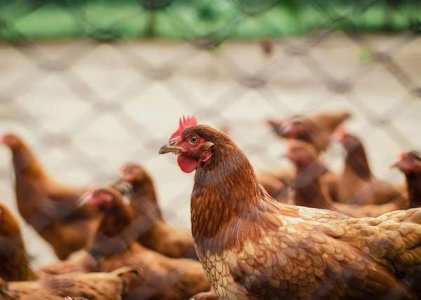Could bird flu contamination affect your breakfast? What you need to know before eating eggs, chicken, or dairy!
By
Veronica E.
- Replies 0
As news reports swirl around the latest bird flu outbreak, it’s understandable to feel concerned about the safety of the foods we rely on—especially breakfast staples like eggs, chicken, and dairy.
Here at The GrayVine, we believe staying informed is key to not only maintaining good health but also keeping peace of mind. Let’s break down the facts and clear up any confusion about the potential impact of bird flu on the foods we love.
Bird flu, also known as avian influenza, is a viral infection that primarily affects birds, though it has the potential to infect humans and other animals.
The current strain in the news is H5N1, which has sparked concern in the poultry industry. But just how much risk does it pose to our breakfast table? Let’s find out.

Can You Get Bird Flu from Eating Eggs?
The short answer is no—so long as you handle and cook eggs properly. According to the Food and Drug Administration (FDA), the risk of bird flu in eggs is low, especially when purchased from reputable sources that follow strict packaging and storage guidelines.
To ensure safety, eggs should be cooked to an internal temperature of 145°F, which kills any harmful pathogens, including bird flu and Salmonella.
What About Chicken?
Just like eggs, chicken is safe to eat when handled with proper kitchen hygiene. Always wash your hands thoroughly before and after handling raw poultry, and ensure chicken is cooked to an internal temperature of 165°F.
Avoid washing raw chicken, as this can spread bacteria around your kitchen. Using a meat thermometer is a great way to ensure your chicken is cooked thoroughly.
And Dairy Products?
When it comes to milk, cheese, yogurt, and other dairy products, pasteurization is your safeguard. Pasteurized dairy products have been treated to eliminate harmful pathogens, making them safe to consume.
While there’s limited data on the transmission of bird flu through raw milk, it’s generally best to avoid unpasteurized dairy to reduce the risk of foodborne illnesses.
Frequently Asked Questions
1. What symptoms should I look out for?
Bird flu symptoms in humans can range from none to mild or severe, including a cough, sore throat, fever, muscle aches, fatigue, and shortness of breath. If you suspect exposure, contact your healthcare provider right away.
While pets can contract bird flu, the CDC states that transmission to humans is unlikely. However, it’s still important to monitor your pets’ health and maintain good hygiene.
3. Should I be worried about bird flu spreading?
While it’s important to stay vigilant, there’s no need to panic. Follow good hygiene practices like regular handwashing and stay informed through public health advisories.
You can still enjoy your breakfast favorites during a bird flu outbreak. By choosing pasteurized dairy and properly cooking eggs and chicken, you can eat with confidence. Always follow the FDA’s food safety guidelines to protect yourself and your loved ones from potential health risks.

Have you changed your cooking habits in light of the bird flu news? Do you have any tips for ensuring food safety at home? Share your thoughts and join the conversation below. Together, we can approach these concerns with wisdom and care, making sure our golden years—and our golden yolks—stay as safe and enjoyable as ever!
Here at The GrayVine, we believe staying informed is key to not only maintaining good health but also keeping peace of mind. Let’s break down the facts and clear up any confusion about the potential impact of bird flu on the foods we love.
The current strain in the news is H5N1, which has sparked concern in the poultry industry. But just how much risk does it pose to our breakfast table? Let’s find out.

Proper cooking and food safety practices ensure that chicken remains safe to enjoy, even during a bird flu outbreak. Image Source: Pexels / Italo Melo.
Can You Get Bird Flu from Eating Eggs?
The short answer is no—so long as you handle and cook eggs properly. According to the Food and Drug Administration (FDA), the risk of bird flu in eggs is low, especially when purchased from reputable sources that follow strict packaging and storage guidelines.
To ensure safety, eggs should be cooked to an internal temperature of 145°F, which kills any harmful pathogens, including bird flu and Salmonella.
What About Chicken?
Just like eggs, chicken is safe to eat when handled with proper kitchen hygiene. Always wash your hands thoroughly before and after handling raw poultry, and ensure chicken is cooked to an internal temperature of 165°F.
Avoid washing raw chicken, as this can spread bacteria around your kitchen. Using a meat thermometer is a great way to ensure your chicken is cooked thoroughly.
And Dairy Products?
When it comes to milk, cheese, yogurt, and other dairy products, pasteurization is your safeguard. Pasteurized dairy products have been treated to eliminate harmful pathogens, making them safe to consume.
While there’s limited data on the transmission of bird flu through raw milk, it’s generally best to avoid unpasteurized dairy to reduce the risk of foodborne illnesses.
Frequently Asked Questions
1. What symptoms should I look out for?
Bird flu symptoms in humans can range from none to mild or severe, including a cough, sore throat, fever, muscle aches, fatigue, and shortness of breath. If you suspect exposure, contact your healthcare provider right away.
2. Can my pets transmit bird flu to me?While pets can contract bird flu, the CDC states that transmission to humans is unlikely. However, it’s still important to monitor your pets’ health and maintain good hygiene.
3. Should I be worried about bird flu spreading?
While it’s important to stay vigilant, there’s no need to panic. Follow good hygiene practices like regular handwashing and stay informed through public health advisories.
You can still enjoy your breakfast favorites during a bird flu outbreak. By choosing pasteurized dairy and properly cooking eggs and chicken, you can eat with confidence. Always follow the FDA’s food safety guidelines to protect yourself and your loved ones from potential health risks.
Key Takeaways
- Proper food handling and safety procedures should be followed when cooking eggs and chicken to prevent the risk of bird flu and other foodborne illnesses.
- It is safe to consume pasteurized dairy products during a bird flu outbreak, as the pasteurization process kills potential foodborne pathogens.
- Symptoms of bird flu in humans can range from asymptomatic to severe, with mild symptoms including eye redness, cough, and sore throat.
- Although bird flu can be contracted by pets, it is unlikely they will transmit it to humans; however, it is important to monitor the health of both pets and their owners.
Have you changed your cooking habits in light of the bird flu news? Do you have any tips for ensuring food safety at home? Share your thoughts and join the conversation below. Together, we can approach these concerns with wisdom and care, making sure our golden years—and our golden yolks—stay as safe and enjoyable as ever!






